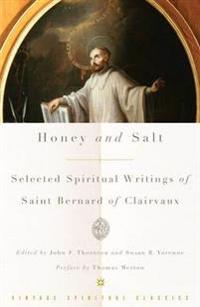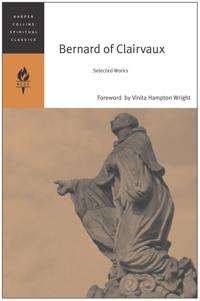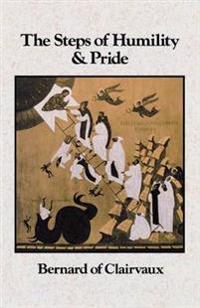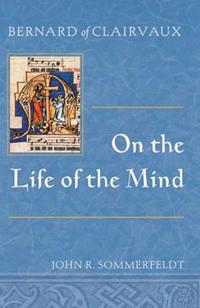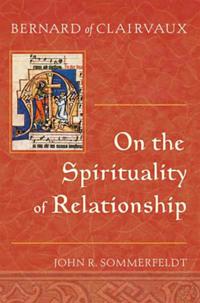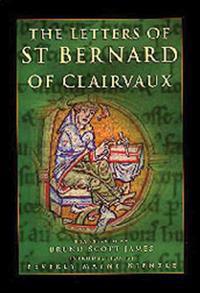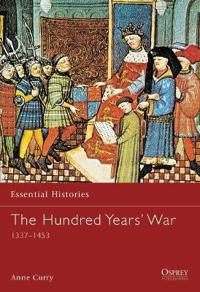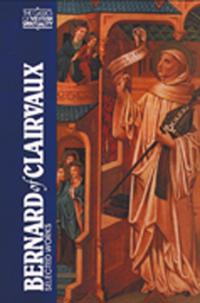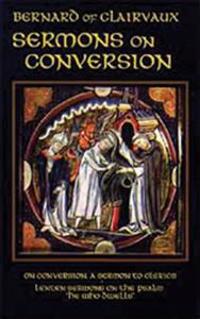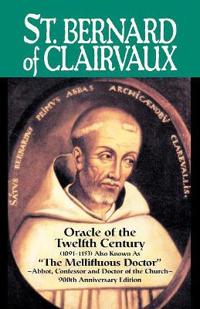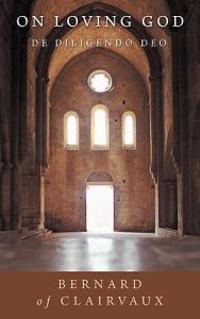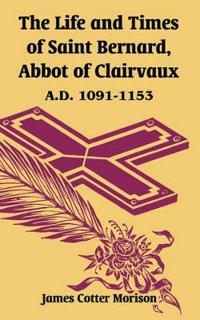Love Without Measure: Extracts from Bernard of Clairvaux (Pocket)
avBernard of Clairvaux, Dimier, Paul, Bernard
ISBN: 9780879077273In 1090 St. Bernard of Clairvaux, a monk of the Cistercian order, was born. One of the great figures of his age, he travelled and preached widely; Cistercian abbeys were founded all over Europe. He left many writings, which included his famous treatises on humility, on the love of God, on grace and [...]
Honey and Salt: Selected Spiritual Writings of Bernard of Clairvaux (Häftad)
avBernard of Clairvaux, John F. Thornton, Susan B. Varenne
ISBN: 9780375725654 - UTGIVEN: 200704Bernard of Clairvaux (Häftad)
avBernard of Clairvaux
ISBN: 9780060750671 - UTGIVEN: 200501Bernard of Clairvaux holds a distinguished place in the history of Christian spirituality. During the twelfth century this gentle monk from France became the primary guide for those who follow the path of selfless love as well as a spokesman for a revival in monastic life. This collection of his mos[...]
Steps of Humility and Pride (Häftad)
avSt.Bernard of Clairvaux, Bernard of Clairvaux
ISBN: 9780879071158 - UTGIVEN: 1989-01Saint Bernard Abbot of Clairvaux: Selections from His Writings (Pocket)
avSaint Bernard
ISBN: 9781107643277 - UTGIVEN: 2013-04-04This 1010 book contains a selection of the letters, meditations, sermons, hymns and other writings of Saint Bernard of Clairvaux (1090-1153).[...]
Bernard of Clairvaux on the Life of the Mind
ISBN: 9780809142033 - UTGIVEN: 2004-03Eminent scholar and educator John Sommerfeldt has written a book that will be welcomed by students as well as seasoned scholars in the academic world. It is a one-volume study of all of the essential aspects of Bernard of Clairvaux's thought. A key figure in the first half of the twelfth century, Be[...]
Bernard of Clairvaux On the Spirituality of Relationship (häftad)
ISBN: 9780809142538 - UTGIVEN: 2003-07Bernard was surely one of the most important leaders of Christendom in the first half of the twelfth century. Indeed, it could be argued that, in the last half of his life, he was the most influential person in Europe. How is it that a monk dedicated to withdrawal from the world could have so much[...]
The Letters of St. Bernard of Clairvaux
ISBN: 9780879071622 - UTGIVEN: 1998-01This classic translation of the correspondence of Bernard is reprinted with a new introduction which takes into account the wealth of scholarship which has appeared in the last forty years. Professor Kienzle discusses the translation of medieval and monastic letter-writing and provides a new chronol[...]
First Life of Bernard of Clairvaux (häftad)
ISBN: 9780879071769 - UTGIVEN: 2015-12"The First Life of Bernard of Clairvaux," traditionally known as the "Vita Prima," originated to prepare the case for canonization of Bernard, first abbot of Clairvaux. The work was begun by William of Saint-Thierry, continued by Arnold of Bonneval, and completed by Geoffrey of Auxerre.
When the[...]Athirst for God: Spiritual Desire in Bernard of Clairvaux's Sermons on the Song of Songs Cs77 (Häftad)
ISBN: 9780879072773 - UTGIVEN: 1987-01The Bible is the monk's book. The thought and teaching of St Bernard of Clairvaux was so saturated with Scripture that the reader often cannot decide where the Bible ends and Bernard begins. From direct quotations to fine allusions, Bernard assumed that his readers were as familiar with the Bible as[...]
Bernard of Clairvaux
ISBN: 9780879074548 - UTGIVEN: 2016-03On the anniversary of the dedication of the monastery church at Clairvaux, Saint Bernard spoke to the community to explain the meaning of the feast: "What sanctity can these stones have that we should celebrate their festival? They do indeed have sanctity, but it is because of your bodies...Your bod[...]
Sermons on Conversion: On Conversion, a Sermon to Clerics and Lenten Sermons on the Psalm 'he Who Dwells' (Häftad)
avBernard of Clairvaux
ISBN: 9780879079253 - UTGIVEN: 1981-03The burgundian reformer abbot draws a picture of the perfect frontier bishop, and holds him up as a model for bishops everywhere.Conversion is used here not in the modern sense of transferring from on ecclesiastical body to another, but in the patristic and monastic sense of metanoia, turning one's [...]
St. Bernard of Clairvaux
ISBN: 9780895554536 - UTGIVEN: 1991-01Abbot; Confessor; Doctor of the Church (1091-1153). In all history no other man so dominated his times and influenced its people. He prophesied; cast out devils; worked miracles; destroyed heresy; single-handedly healed a schism; launched a crusade; advised popes; guided councils (6); ended a pogrom[...]
On Loving God: de Diligendo Deo (Häftad)
avBernard Of Clairvaux
ISBN: 9781926777122 - UTGIVEN: 2009-12The Life And Times Of Saint Bernard, Abbot Of Clairvaux: A.d. 1091-1153 (Pocket)
avJames Cotter Morison
ISBN: 9781410214911 - UTGIVEN: 2004-07


